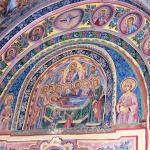
Jesus, according to Scripture, told his followers that he would eventually be executed. We are also told that this was something which they did not want to hear:
As they were gathering in Galilee, Jesus said to them, “The Son of man is to be delivered into the hands of men, and they will kill him, and he will be raised on the third day.” And they were greatly distressed (Matt. 17:22-23 RSV).
Some might think that such statements were inserted into the Gospel narrative and were not really said by Jesus. Others might believe that the Gospel writers were reflecting upon something which was said by Jesus, but they misremembered his statements in light of his resurrection, that is, he might have talked about the time in which he would eventually die, but he didn’t give indication that he would be executed and then soon afterward raised from the dead.
Certainly, it seems odd that if he really made such statements, his violent death and subsequent resurrection would have been a surprise to his disciples, for they would have been forewarned. Even if they didn’t want to accept it before it happened, they would recognize his words were being fulfilled when he was taken by the authorities and crucified. On the other hand, we often find when he said such words, his disciples, like Peter, would deny they should ever happen; they were words which his followers did not want to hear, and so it is quite possible, they filtered out such statements from their conscious memory, and it was only after the resurrection that they remembered what he predicted.
Many of us have experienced similar things in our lives, as we have filtered out things we were told that we didn’t want to hear, only to remember that someone warned us about what could and would happen once it was too late.
Truth be told, Christians still ignore the full significance of such passages; they might know of them, but they still filter out many of the implications found in them as they create their own systemic presentations of what they believe. For example, many Christians think sin and death are so interlinked that only those tainted by sin could die. This comes from the way they read and interpret Scripture when it says wages of sin is death (cf. Rom. 6:23). All one has to do to see the fault in this line of reasoning is to see that Jesus was without sin, and yet he could and did die; while it can be and is theologically correct to say there is a connection between sin the world and death as we now experience it, the connection does not mean one has to personally sin in order to be able to die; if we said otherwise, Jesus would have to be seen as a sinner, which of course, he was not. Jesus took on the condition of the world, lived and died in it without sin; his death without sin allowed him to disconnect the way death has been tainted by sin, so that death would no longer lead to the continued dissolution of the person who dies, a dissolution which is often called “spiritual death” because it affects more than our material being. By removing the necessary connection between death and sin, by showing the death of someone who is sinless, what happens in death itself is changed, so that death can become a tool, not of the dissolution of the person, but their continued transformation and theosis: death which is contaminated by sin has been vanquished by the death of one without sin, and so the destruction which sin caused in death can and has indeed come to an end.
All of us will one day die. Our sins will influence our death, but thanks to Jesus, our sins do not have to define us and who we are in eternity. Everyone dies. Everyone will come to an end to their temporal existence. There is no avoiding it. Even though we now can be made alive in Christ, we will come to the time in which our temporal existence comes to an end; but, because we have been made alive in Christ, death no longer has the sting which it once had when it was corrupted by and controlled by sin. Death can still be terrible, indeed painful, but its sting, the way death led the corruption and denigration of the spirit, has been overcome. Now, following Christ, we should see how death is a tool; though it still is something which we would rather not face, we can find good is to be had with it, for it helps us move beyond all the pain and suffering of temporal existence and enter eternity with Christ. This also means that those who use death as a threat against us will find that they no longer have any power over us, a point Paul once made:
For I think that God has exhibited us apostles as last of all, like men sentenced to death; because we have become a spectacle to the world, to angels and to men. We are fools for Christ’s sake, but you are wise in Christ. We are weak, but you are strong. You are held in honor, but we in disrepute. To the present hour we hunger and thirst, we are ill-clad and buffeted and homeless, and we labor, working with our own hands. When reviled, we bless; when persecuted, we endure; when slandered, we try to conciliate; we have become, and are now, as the refuse of the world, the offscouring of all things (1 Cor. 4:9-13 RSV).
Death can now lead us to life, to new life, to eternal life, that is, the eternal experience of the kingdom of heaven. Of course, if we die with some taint of sin, we shall experience a little of the sting of death, as we will have to undergo some purification for that sin. However, that is far different from the sting death had when it was ruled by sin, for then the sin could not and would not be purified, and so its corruption, its pain and sorrow, would be with us without end; that is what the spiritual death, the kind of death sin brought into the world, was about. And it is this aspect of death which Jesus overthrew. Death no longer is the plaything of sin; though sin can and still have a connection to our experience of death, it doesn’t rule over us in death, for Jesus is the Lord, even over death itself. This is why Jesus, who, though without sin, could and did die, so that he could realize the reconstruction of death within himself, proving his lordship is, like his love, stronger than death itself.
Stay in touch! Like A Little Bit of Nothing on Facebook.
If you liked what you read, please consider sharing it with your friends and family!













